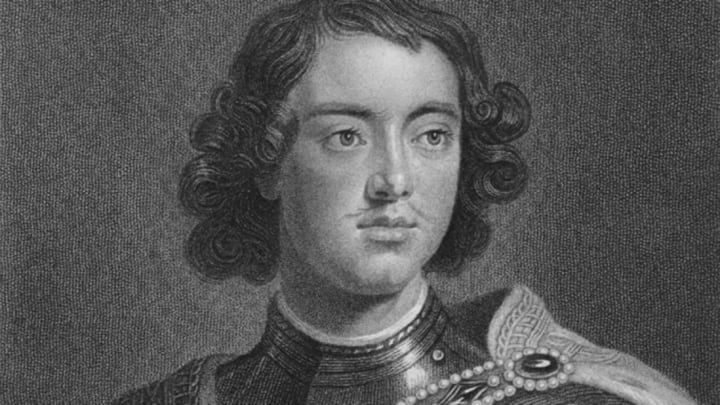Beards might seem like an odd target for taxation, but to Peter the Great (1672-1725)—Russia’s revolutionary Czar—facial hair was no laughing matter.
Born in Moscow with the name Pyotr Alekseyvich Romanov on June 9, 1672, the young royal would—more than any other figure—be credited with the modernization of Russia. Feeling that his country’s culture, technology, and politics were anachronistically agrarian, Peter embarked upon a lengthy tour of Western Europe in 1697. During this trek, he took in such sights as Oxford University, the British Royal Mint, and the Dutch naval yard (en route, Peter also met a promising scientist by the name of Isaac Newton).
Throughout his reign, the Czar vigorously implemented broad governmental reforms which he felt would finally break Russian society free of its pastoral ancestry. Among the biggest feathers in Peter’s legislative cap were the establishment of a well-trained standing army, a state-of-the-art navy, and the foundation of St. Petersburg (whose strategic location helped strengthen Russia’s role in the Baltic trade-routes) in 1703.
But to Peter, simply imitating Western military and exchange techniques wasn’t enough. To complete this transformation, he also sought to imitate the region’s very fashion sense.
After Peter’s triumphant return to Russia at the end of his European voyage in 1698, a joyous reception was thrown in his honor. In attendance were his commander of the army, his frequent second-in-command Fyodor Romodanovsky, and a host of assorted aides and diplomats. Suddenly, the crowd’s mood went from elation to horror as Peter unexpectedly pulled out a massive barber’s razor. As biographer Robert K. Massie writes, “After passing among his [friends] and embracing them… he began shaving off their beards” with his own hands! Given his political stature, none of his associates dared question this stunning turn of events. (His physical stature didn't hurt either: Peter stood an imposing 6’8”.)
Hairless necks and faces were all the rage in the Western World, so the Czar initially ordered that all of his subjects (excluding clergy and peasants) must lose their face fuzz. So dedicated was Peter to his cause that he even instructed police officials to personally shave those who refused to comply on sight.
However, as time wore on, Peter began to question the practicality of this crusade. Members of the Russian Orthodox Church were particularly critical, citing the mandate as blasphemous. As Ivan the Terrible (1530-1584) had once put it, “Shaving the beard is a sin the blood of all martyrs will not wash away. It would mean blemishing the image of man as God created him.”
Eventually, the ruler’s stance softened. Smelling a profit, Peter imposed an annual “beard tax” upon those who hoped to keep their facial hair. An impoverished beggar could retain his for the meager yearly sum of two kopeks, while a well-off merchant could expect to shell out 100 rubles. Upon depositing the cash, beard-fanciers would receive a small, copper coin upon that read “tax paid.” Despite the fee’s widespread unpopularity, it remained in place until 1772, 47 years after Peter’s death.
